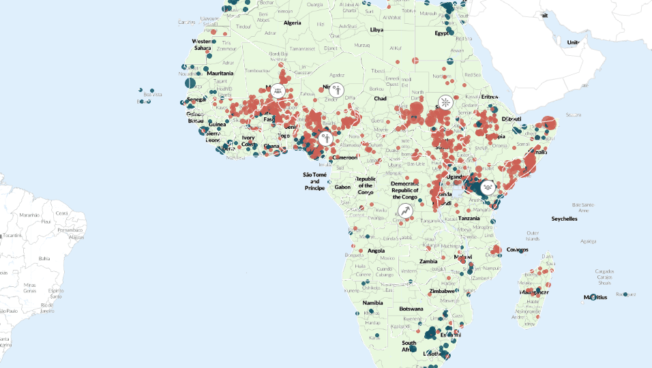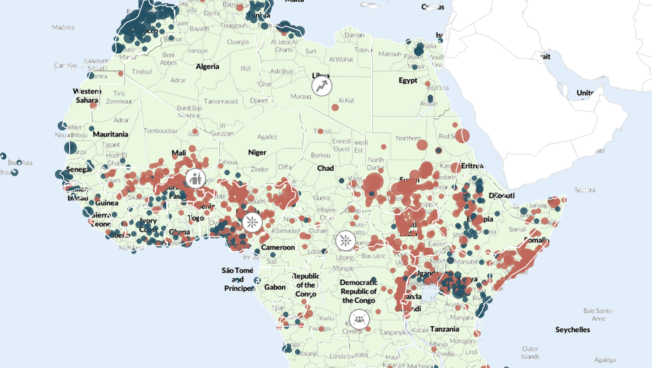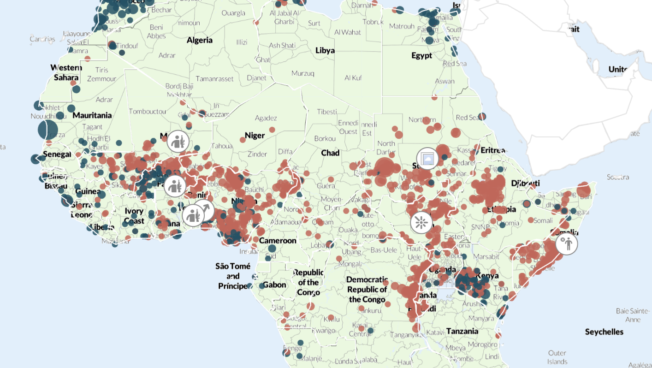Regional Overview
Africa
October 2024
Posted: 8 November 2024
In this Regional Overview
- Central African Republic: Rising civilian targeting by state forces and Azande Ani Kpi Gbe
- Mozambique: Post-election unrest breaks out countrywide
- Niger: JNIM attack on a security checkpoint in Niamey illustrates vulnerabilities in Sahelian capitals
- Somalia: Military offensives lead to escalating battles against al-Shabaab
- Sudan: Violence in al-Jazirah contributes to the most fatal month of the war
Central African Republic: Rising civilian targeting by state forces and Azande Ani Kpi Gbe
Violence by state forces and ethnic self-defense militias drove a sharp increase in civilian targeting in October in the Central African Republic. Among the groups responsible for most incidents of violence against the civilian population is the Azande Ani Kpi Gbe. Formed in 2023, Azande Ani Kpi Gbe claims to protect the Azande people and primarily operates in the Haut-Mbomou prefecture with support from the Central African Armed Forces (FACA) and the Wagner Group to combat rebel groups operating under the Coalition of Patriots for Change.1Mondeafrique, ‘L’incroyable constellation des groupes armés en Centrafrique,’ 27 January 2024; United Nations Multidimensional Integrated Stabilization Mission in the Central African Republic, ‘Monthly Report: Human Rights Situation,’ April 2024 Since its formation, however, 41% of the group’s total operations have involved civilian targeting, often against ethnic Fulani and Muslims. Azande Ani Kpi Gbe also has a precarious relationship with FACA, as it battles state forces and collaborates with them during specific operations. October was the most active month for Azande Ani Kpi Gbe militants in 2024. Yet, all of the operations carried out by the group last month targeted civilians and resulted in at least 21 reported fatalities. Consistent with past activity, over half of the violence targeting civilians last month by Azande Ani Kpi Gbe targeted ethnic Fulani and Muslims.
Mozambique: Post-election unrest breaks out countrywide
On 24 October, the National Elections Commission announced a landslide victory for the ruling Mozambique Liberation Front (FRELIMO) candidate, Daniel Chapo, in the presidential election and an overwhelming majority for FRELIMO in the National Assembly.2República de Moçambique, ‘Centralização Nacional da Contagem Geral – eleições gerais e eleições das assembleias provinciais e do governador da província,’ 24 October 2024 Widespread disorder followed the announcement of the results, headlined by a series of demonstrations by members of the opposition Optimist Party for the Development of Mozambique (PODEMOS) under the leadership of Venâncio Mondlane.3Paul Fauvet, ‘Venâncio Mondlane calls general strike,’ Agência de Informação de Moçambique, 16 October 2024; RFI, ‘Venâncio Mondlane convoca novas manifestações para quinta e sexta-feira,’ 22 October 2024 Mondlane claims he is the actual victor and FRELIMO committed fraud to win the election.4Al Jazeera, ‘Mozambique ruling party declared winner of election amid fraud claims,’ 24 October 2024 Two PODEMOS affiliates, Elvino Dias and Paulo Guambe, were killed by suspected state forces in Maputo on 18 October.5Zelio Tembe, ‘Advogado de Venâncio Mondlane e mandatário do PODEMOS mortos a tiros,’ Agência de Informação de Moçambique, 19 October 2024 Dias, Mondlane’s lawyer, was working on an appeal to the Constitutional Council against the official results.6Club of Mozambique,‘CIP Mozambique Elections: Elvino Dias was killed preparing a draft of the Podemos appeal to the Constitutional Counci,’ 20 October 2024 The post-election unrest, recorded in at least 11 of Mozambique’s provinces, drove a 58% increase in political violence from the previous month. Government actions to repress PODEMOS members suggest that FRELIMO perceives a significant threat in Mondlane’s leadership.
Niger: JNIM attack on a security checkpoint in Niamey illustrates vulnerabilities in Sahelian capitals
On 26 October, al-Qaeda-affiliated Jama’at Nusrat al-Islam wal-Muslimin (JNIM) militants attacked a security checkpoint in the Seno district in Niger’s capital, Niamey, resulting in one fatality, the capture of an AK-47 rifle, and the destruction of a vehicle. JNIM militants have steadily increased their operational presence in the Niamey area in 2024, carrying out a variety of attacks, including armed assaults on military patrols and gendarmerie checkpoints, looting, and the detonation of explosive devices targeting government and civilian vehicles. Similarly, JNIM has targeted the Malian capital of Bamako. In September, two coordinated attacks targeted a gendarmerie training facility and the international airport.
These events reflect broader regional dynamics as the jihadist insurgency, traditionally rooted in rural areas, increasingly encroaches on capital cities. Rapid urbanization and the strategic targeting of capital cities to maximize impact pose a major security challenge. The overlap of urban and rural areas creates new vulnerabilities as militant groups exploit less secure outskirts as access points into urban conglomerates. In addition, the technological evolution of the protracted conflict in the Sahel poses an even greater threat to urban security through the increasing use of drone warfare and remote violence by non-state armed actors.
Somalia: Military offensives lead to escalating battles against al-Shabaab
Somali military offensives and operations by al-Shabaab led to a 35% increase in battles in October compared to the previous month. Last month, contestation between al-Shabaab and military forces continued at high levels in Lower Shabelle region but also escalated in Galgaduud and Middle Shabelle regions, where military forces carried out specific operations to dislodge al-Shabaab from several strategic bases.7X @SONNALIVE, 8 October 2024 Notable concentrations of violence took place in the Ceel Dheer district of Galgaduud region, where military forces and allied Abgal clan militias targeted al-Shabaab strongholds (for more, see ACLED’s October Situation Update). The clashes in October marked the highest number of monthly battles since a previous escalation of fighting with al-Shabaab in September 2022.
The increase in clashes came as President Hassan Sheikh Mohamud formalized agreements with Eritrea and Egypt on 10 October amid increasing tension with Ethiopia.8Mohamed Olad Hassan, ‘Somalia military strikes major blow to al-Shabab, kills 30 militants,’ Voice of America, 19 October 2024; Nosmot Gbadamosi, ‘An Anti-Ethiopia Alliance Takes Shape,’ Foreign Policy, 16 October 2024 The agreements were made to strengthen military relations even though military support to Somalia from Egypt and Eritrea already included shipments of ammunition, small arms, and heavy weapons.9Abdi Sheikh and Giulia Paravicini, ‘Egypt sends arms to Somalia following security deal, sources say,’ Reuters, 298 August 2024; Will Ross and Damian Zane, ‘Egyptian ship delivers weapons to Somalia,’ BBC, 24 September 2024 The Somalian president also visited Uganda on 19 October to sign a memorandum of understanding (MoU) on defense cooperation with Kampala’s government.10New Vision Uganda, ‘Pacifying Somalia: Presidents Museveni and Mohamud hold talks,’ 20 October 2024 Since a MoU was signed between Ethiopia and Somaliland for Ethiopian seaport access in exchange for recognizing Somaliland’s sovereignty, relations between Mogadishu and Addis Ababa have deteriorated.
Sudan: Violence in al-Jazirah contributes to the most fatal month of the war
On 20 October, the Rapid Support Forces (RSF) commander from al-Jazirah state, Abu Aqla Keikel, defected with troops under his command and joined the ranks of the Sudanese Armed Forces (SAF).11Sudan War Monitor, ‘Sudan army continues offensive following savage RSF reprisal attacks,’ 30 October 2024; Kersten Knipp, ‘Sudan war sees mass killings and no sign of ending,’ Deutsche Welle, 31 October 2024 In reprisal for Keikel’s desertion, the RSF carried out widespread violence in his home state of al-Jazirah, where political violence more than doubled in October compared to the previous month. Over 75% of the violence involved civilian targeting. ACLED records more than 90 such events, including sexual violence and abductions. Residents claimed that RSF branded civilians in the area as supporters of Keikel and carried out violence as a punishment for his defection to the SAF.12Katharine Houreld and Hafiz Haroun, ‘A commander swapped sides in Sudan’s civil war. His community paid in blood,’ Washington Post, 1 November 2024 Violence in al-Jazirah state was almost exclusively carried out by the RSF, resulting in over 260 reported civilian fatalities and the displacement of more than 47,000 people fleeing the violence.13Kersten Knipp, ‘Sudan war sees mass killings and no sign of ending,’ Deutsche Welle, 31 October 2024 The escalation in deadly civilian targeting in al-Jazirah state contributed to the deadliest month of the war in Sudan since the conflict began in April 2023, with over 2,600 fatalities reported across the country in October.
République centrafricaine : augmentation des violences contre les civils par les forces étatiques et les milices Azandé Ani Kpi Gbé
Les violences commises par les forces étatiques et les milices d’autodéfense ethniques ont entraîné une forte augmentation des violences visant des civils en octobre en République centrafricaine. Parmi les groupes responsables de la majorité des violences visant les populations civiles figure Azandé Ani Kpi Gbé. Formée en 2023, la milice Azandé Ani Kpi Gbé affirme protéger le peuple Azandé et opère principalement dans la préfecture du Haut-Mbomou. Elle est soutenue par les Forces armées centrafricaines (FACA) et le groupe Wagner, dans le but de combattre les groupes rebelles opérant au sein de la Coalition des patriotes pour le changement.1Mondeafrique, « L’incroyable constellation des groupes armés en Centrafrique », 27 janvier 2024 ; Mission multidimensionnelle intégrée des Nations unies pour la stabilisation en République centrafricaine, « Rapport mensuel : Situation des droits de l’homme », Avril 2024 Depuis sa création, cependant, 41 % de l’ensemble des opérations du groupe ont été marquées par des violences visant des civils, souvent des Peuls et des musulmans. La milice Azandé Ani Kpi Gbé entretient également une relation précaire avec les FACA, car elle combat les forces étatiques tout en collaborant avec elles lors d’opérations ponctuelles. Le mois d’octobre 2024 a été marqué par un pic d’activité des militants Azandé Ani Kpi Gbé. Cependant, toutes les opérations menées par la milice le mois dernier visaient des civils et ont entraîné au moins 21 décès signalés. Conformément aux tendances observées précédemment, plus de la moitié des violences perpétrées contre des civils le mois dernier par Azandé Ani Kpi Gbé visaient des membres de l’ethnie peule et des musulmans.
Mozambique : des troubles post-électoraux éclatent à l’échelle nationale
Le 24 octobre, la Commission électorale nationale (CNE) a annoncé une victoire écrasante de Daniel Chapo, candidat du Front de libération du Mozambique (FRELIMO), aux élections présidentielles, ainsi qu’une large majorité pour le FRELIMO à l’Assemblée nationale.2República de Moçambique, «Centralização Nacional da Contagem Geral – eleições gerais e eleições das assembleias provinciais e do governador da província», 24 octobre 2024 Des troubles généralisés ont suivi l’annonce des résultats, avec en tête une série de manifestations de militants du parti d’opposition Optimiste pour le développement du Mozambique (PODEMOS), dirigé par Venâncio Mondlane.3Paul Fauvet, ‘Venâncio Mondlane calls general strike,’ Agência de Informação de Moçambique, 16 octobre 2024 ; RFI, ‘Venâncio Mondlane convoca novas manifestações para quinta e sexta-feira,’ 22 octobre 2024 Mondlane affirme qu’il est le véritable vainqueur et accuse le FRELIMO d’avoir eu recours à la fraude pour remporter l’élection.4Al Jazeera, ‘Mozambique ruling party declared winner of election amid fraud claims,’ 24 October 2024 Deux militants de PODEMOS, Elvino Dias et Paulo Guambe, ont été tués à Maputo le 18 octobre, par des forces soupçonnées d’être liées à l’État.5Zelio Tembe, «Advogado de Venâncio Mondlane e mandatário do PODEMOS mortos a tiros», Agência de Informação de Moçambique, 19 octobre 2024 Dias, l’avocat de Mondlane, travaillait sur un recours auprès du Conseil constitutionnel contre les résultats officiels des élections.6Club of Mozambique, «CIP Mozambique Elections: Elvino Dias was killed preparing a draft of the Podemos appeal to the Constitutional Council,’ 20 October 2024 Les troubles post-électoraux, enregistrés dans au moins 11 provinces du Mozambique, ont entraîné une augmentation de 58 % des violences politiques par rapport au mois précédent. Les mesures répressives du gouvernement à l’encontre des membres de PODEMOS indiquent que le FRELIMO considère le leadership de Mondlane comme une véritable menace.
Niger : une attaque du GSIM contre un poste de contrôle à Niamey illustre les vulnérabilités des capitales sahéliennes
Le 26 octobre, des militants du Groupe de soutien à l’islam et aux musulmans (GSIM), affilié à Al-Qaïda, ont attaqué un poste de contrôle dans le district de Séno, dans la capitale du Niger, Niamey. Cette attaque a causé un décès, la capture d’un fusil AK-47, ainsi que la destruction d’un véhicule. Les militants du GSIM ont progressivement renforcé leur présence opérationnelle dans la région de Niamey en 2024. Ils y ont mené diverses attaques, notamment des assauts armés contre des patrouilles militaires et des postes de contrôle de la gendarmerie, des pillages, ainsi que la détonation d’engins explosifs visant des véhicules gouvernementaux et civils. Des activités similaires ont été menées par le GSIM à Bamako, la capitale du Mali. En septembre, deux attaques coordonnées y ont visé une installation de formation de la gendarmerie et l’aéroport international.
Ces événements s’inscrivent dans une dynamique régionale plus large, marquée par l’expansion progressive de l’insurrection djihadiste, qui, autrefois confinée aux zones rurales, gagne désormais du terrain dans les capitales. L’urbanisation rapide couplée au ciblage stratégique des capitales pour maximiser l’impact des attaques posent un défi majeur en matière de sécurité. Le chevauchement entre zones urbaines et rurales crée de nouvelles vulnérabilités, les groupes militants exploitant les périphéries moins sécurisées comme points d’accès aux agglomérations urbaines. Par ailleurs, l’évolution technologique sur fond de crise persistante au Sahel constitue une menace croissante pour la sécurité urbaine, en raison notamment du recours croissant à la guerre par drones et aux violences à distance par des acteurs armés non étatiques.
Somalie : les offensives militaires entraînent une escalade des combats contre les Chabab
En octobre, les offensives militaires somaliennes et les opérations menées par les Chabab ont entraîné une augmentation de 35 % des combats par rapport au mois précédent. Le mois dernier, les confrontations entre les Chabab et les forces militaires sont restés intenses dans la région de Shabeellaha Hoose. Elles se sont également intensifiées dans les régions de Galguduud et du Shabeellaha Dhexe, où les forces militaires ont mené des opérations ponctuelles pour déloger les Chabab de plusieurs bases stratégiques.7X @SONNALIVE, 8 octobre 2024 Des poches notables de violences ont été recenser dans le district de Ceel Dheer, dans la région de Galgaduud, où les forces militaires et les milices alliées du clan des Abgaal ont ciblé des bastions chabab (pour plus de détails, voir la mise à jour de la situation d’octobre d’ACLED). Les affrontements survenus en octobre ont constitué un pic mensuel de combats, le plus élevé depuis l’escalade précédente des combats contre les Chabab en septembre 2022.
La multiplication des affrontements est survenue alors que le président Hassan Sheikh Mohamud a officialisé des accords avec l’Érythrée et l’Égypte le 10 octobre, dans un contexte de tensions croissantes avec l’Éthiopie.8Mohamed Olad Hassan, ‘Somalia military strikes major blow to al-Shabab, kills 30 militants,’ Voice of America, 19 October 2024; Nosmot Gbadamosi, ‘An Anti-Ethiopia Alliance Takes Shape,’ Foreign Policy, 16 October 2024 Ces accords visaient à renforcer les relations militaires des trois pays, bien que le soutien militaire de l’Égypte et de l’Érythrée à la Somalie prévoie déjà des livraisons de munitions, d’armes légères et d’armes lourdes.9Abdi Sheikh and Giulia Paravicini, ‘Egypt sends arms to Somalia following security deal, sources say,’ Reuters, 28 August 2024; Will Ross and Damian Zane, ‘Egyptian ship delivers weapons to Somalia,’ BBC, 24 September 2024 Le président somalien s’est également rendu en Ouganda le 19 octobre pour signer un mémorandum d’entente sur la coopération en matière de défense avec le gouvernement de Kampala.10New Vision Uganda, ‘Pacifying Somalia: Presidents Museveni and Mohamud hold talks,’ 20 October 2024 Depuis qu’un mémorandum d’entente a été signé entre l’Éthiopie et le Somaliland pour l’accès au port maritime éthiopien en échange de la reconnaissance de la souveraineté du Somaliland, les relations entre Mogadiscio et Addis-Abeba se sont détériorées.
Soudan : les violences dans l’État d’Al-Jazirah marquent le mois le plus meurtrier de la guerre
Le 20 octobre, le commandant des Forces de soutien rapide (RSF) de l’État d’Al-Jazirah, Abu Aqla Keikel, a fait défection avec les troupes sous son commandement pour rejoindre les rangs des Forces armées soudanaises (SAF).11Sudan War Monitor, ‘Sudan army continues offensive following savage RSF reprisal attacks,’ 30 October 2024; Kersten Knipp, ‘Sudan war sees mass killings and no sign of ending,’ Deutsche Welle, 31 October 2024 En représailles à la défection de Keikel, les RSF ont perpétré des violences de masse dans son État natal d’Al-Jazirah, où les violences politiques ont plus que doublé en octobre par rapport au mois précédent. Plus de 75 % de ces violences ont visé des civils. ACLED recense plus de 90 événements de ce type, y compris des violences sexuelles et des enlèvements. Des habitants ont affirmé que les RSF avaient accusé les civils de la région d’être des partisans de Keikel et commis ces violences en guise de punition pour sa défection aux SAF.12Katharine Houreld and Hafiz Haroun, ‘A commander swapped sides in Sudan’s civil war. His community paid in blood,’ Washington Post, 1 November 2024 Les violences dans l’État d’Al-Jazirah ont été presque exclusivement perpétrées par les RSF, causant plus de 260 morts parmi les civils et le déplacement de plus de 47 000 personnes fuyant les violences.13Kersten Knipp, ‘Sudan war sees mass killings and no sign of ending,’ Deutsche Welle, 31 October 2024 L’intensification des attaques meurtrières contre les civils dans l’État d’Al-Jazirah a contribué à faire d’octobre le mois le plus meurtrier de la guerre au Soudan depuis le début du conflit en avril 2023, avec plus de 2 600 morts rapportés dans tout le pays.
See More
See the Codebook and the User Guide for an overview of ACLED’s core methodology. For additional documentation, check the Knowledge Base. Region-specific methodology briefs can be accessed below.
Links:
For additional resources and in-depth updates on the latest political violence and protest trends, check our local observatories for Mozambique and Ethiopia, as well as our special Nigeria Election Violence Tracker project.







